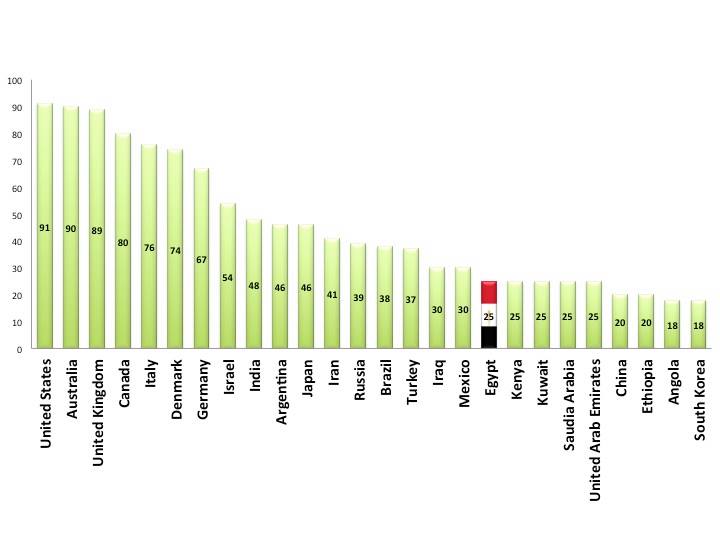How Does The Egyptian Consumer Form His Opinion?

The Egyptian culture and its impact on startups
This is the second in a series of articles tackling the impact of the community’s culture according to Hofstede’s index. You can read the first article in the series here.
Mr.Mohsen: How are the sales of the new mobiles going so far?
Raafat: Not so good, we only sold 3 devices in six months.
Mr.Mohsen: Only three? But the devices are new and have a lot of features better than all other devices in the market.
Raafat: Yes this is true, but the demand isn’t very high on them.
Mr.Mohsen: Maybe because their prices are high?
Raafat: But we put them on sale that reached 25% off and the prices are so much less than all other prices in the market.
Mr.Mohsen: I need to know the feedback of those who already bought the products, please schedule a meeting with them next week.
Raafat: Don’t worry; the two who bought the devices are already working with us in the company here.
Mr.Mohsen: Aren’t you saying that three have purchased the devices?
Raafat: Yes, I’m the third one. I bought it because the salesperson convinced me.
How does the Egyptian consumer decide to buy an important strategic commodity? Starting from his mobile phone or even to buying an apartment or a car?
The second dimension Hofstede talk about is individualism. It reflects the extent of individualism of people within the community and their ability to take care of themselves and their immediate family members in return for collective care.
The higher the country’s score on the index, the more it would be an indicator for an independent society in which most of its inhabitants depend on themselves in their basic affairs. While the low score reflects a collective-oriented society, in which society takes care of individuals in exchange for loyalty.
What distinguishes communities with a high individualism indicator is that their members are always looking for information themselves (They read and select TV programs with original and non-traditional content), and they don’t easily get affected by the opinions of those around them. While in the countries with low indicator, we find that the decision of any individual in the society is highly affected by the opinions of friends, family, colleagues, and the society as whole.
We’ll also find that the low indicator reflects a large state of loyalty to the family or the society or the work. And we’ll find that the relationship between the employee and his company is similar to the family relationship where the employee considers himself an integral part of the company. We’ll also find that the promotion or employment is done by a decision similar to the family decisions from the head of the family – or the employer in this case.
In collective societies, you’ll find that all young people are raised in the same way to be similar. And you’ll also find that the prevailing tone is “my family say good things about X and they say he is kind”, you’ll hear a lot of words similar to “people say that this product is good”, “This brand is good because all my work colleagues say it is”, “My neighbor got this car so I want to get it too”. Collective societies take their decisions based on the general trend, and not based on informed decisions or real advantages in any product.
Who determines for the Egyptian consumer what to buy?
Family – neighbors – school – work
Egypt scores 25 on the indicator, which means that Egypt belongs to collective-oriented societies.
In order to sell in Egypt, your product must belong to a large institution or entity. Thus, the more the product is associated with an institution or entity, the more people will buy it.
A look at some countries and their score of the index can tell us a lot about differentiation and differences. For example, China and South Korea are countries with a low score of 20 and 18, respectively, in Hofstede’s index. This shows how these countries are interested in social relations, even the standard of women's beauty in these countries does not care about the shape of the body, but measures the beauty of women according to their success in social relations because the society puts collectivity above individuality. And, we’ll find the exact opposite in Western societies such as USA, Germany, and Britain. We’ll also find that in collective societies, there is no correlation between your feelings and your behavior, so you might buy something you do not like very much just because the community sees it fits you!
For example, businessmen always have a Mercedes because it gives them a special style.One of the most prominent businessmen in Egypt once told me that he had to buy the newest model Mercedes every year even if he did not have enough money because, as he says, “If I didn’t do so, the merchants will think that I’m in a weak position and I’ll face a lot of problems in the market”.
While in individual societies, we find that behaviors are often compatible with feelings and people do not try to hide their feelings, therefore, they accept any product because of its real value. We’ll also find that in collective societies, people may smile at you and praise your product, but at the time of purchase you won’t find that their smiles have turned to purchase orders, in fact you may find the exact opposite. Everyone who dealt with the Japanese and the Koreans knows well that they may not get angry before you, in fact they may smile courtesy, but if they do not like something they will probably complain and it will be a harsh complaint (based on a personal experience while working as a communications center manager dealing with Japan).
You’ll also find that in collective societies, when they hate a product or a brand, they are as wild as wildfire and it becomes very difficult – or almost impossible – to return the positive picture because consumers are affected quickly and strongly by the opinions of their peers (For example, people’s look to L&M Grand car here in Egypt and the severe criticism it received made the car lose the market as a result of negative publicity).
We’ll also find that people's demand for creative and innovative products increases steadily with increased individuality because people love to have exclusive new product. This is evident in the long line queues in front of Apple stores in the United States and Britain to buy the new iPhone every time it’s released, while we don’t find something similar in our country because we always wait for the opinions of our peers and connections.
Do you have any doubt about that?
Check your Facebook timeline and count the number of posts that have a friend of yours asking his entire friend list about comparison between two or more mobile phones, or cars, or even places to spend the holiday in. And count your own posts about the same topic, and then you’ll be amazed and impressed.
In the end, there is no correct and incorrect culture, but we view every culture as a major component of economic activity in all countries of the world. And, we believe that all entrepreneurs must carefully study the culture of each country so that their decisions are as scientific and right as possible.
And wait for the next article, where we will talk about the third indicator in Hofstede’s index, which is Competitiveness.
This article was translated in English by Allaa Ghanem.






































































EgyptInnovate site is not responsible for the content of the comments